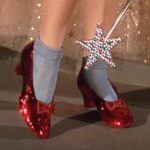 Mysteries
Mysteries  Mysteries
Mysteries  History
History 10 Surprising Stories About the Texas Rangers
 Humans
Humans 10 Philosophers Who Were Driven Mad by Their Own Theories
 Miscellaneous
Miscellaneous 10 Video-Game-Worthy Weapons and Armors from History
 Weird Stuff
Weird Stuff 10 Psychics Who Accurately Predicted Wartime Events
 The Arts
The Arts 10 Pieces of Art Inspired by a Broken Heart
 Health
Health 10 Science Fiction-Sounding New Medical Treatments
 History
History 10 Surprising Facts About the Father of Submarine Warfare
 Space
Space Ten Astonishing New Insights into Alien Worlds
 Weird Stuff
Weird Stuff 10 Bizarre Summer Solstice Rituals Still Practiced Today
 Mysteries
Mysteries Top 10 Haunting Facts About the Ghost Ship MV Alta
 History
History 10 Surprising Stories About the Texas Rangers
 Humans
Humans 10 Philosophers Who Were Driven Mad by Their Own Theories
Who's Behind Listverse?

Jamie Frater
Head Editor
Jamie founded Listverse due to an insatiable desire to share fascinating, obscure, and bizarre facts. He has been a guest speaker on numerous national radio and television stations and is a five time published author.
More About Us Miscellaneous
Miscellaneous 10 Video-Game-Worthy Weapons and Armors from History
 Weird Stuff
Weird Stuff 10 Psychics Who Accurately Predicted Wartime Events
 The Arts
The Arts 10 Pieces of Art Inspired by a Broken Heart
 Health
Health 10 Science Fiction-Sounding New Medical Treatments
 History
History 10 Surprising Facts About the Father of Submarine Warfare
 Space
Space Ten Astonishing New Insights into Alien Worlds
 Weird Stuff
Weird Stuff 10 Bizarre Summer Solstice Rituals Still Practiced Today
Ten Movies Snubbed for Best Picture Oscar Nominations
Crash (2005). The Artist (2011). Green Book (2018). The forgettable Marty (1955). These are among the underwhelming movies awarded filmmaking’s highest honor: The coveted Oscar for Best Picture.
But alas, it’s an honor just to be nominated. Unless you aren’t but deserve to be. Then it just sucks—and many a marvelous movie has been overlooked among its contemporaries by the oft-disparaged Academy of Motion Picture Arts & Sciences. Here are ten, in chronological order.
Related: 10 Screen Greats Never Voted Oscar’s “Best”
10 City Lights (1931)
While many of Charlie Chaplin’s finest films, including 1921’s The Kid and 1925’s The Gold Rush, predate the first Academy Awards ceremony in 1929, the movie many consider his masterpiece, City Lights, premiered two years into the Oscars era.
Written, starring, and directed by the Little Tramp himself, City Lights incorporates two key elements of many Chaplin films. The first is simplicity—a motif rooted in silent films, where an inability to communicate aurally inevitably dampens complexity. Like nearly all Chaplin films, City Lights tells a straightforward story; in this instance, Chaplin’s protagonist falls in love with a blind girl but, while raising money for her sight-restoring surgery, worries she’ll reject him for his underwhelming appearance.
What City Lights offers in return is Chaplin himself. He is, simply, among the most likable actors ever to grace the silver screen–a sort of silent, mustachioed anti-Ryan Reynolds. In a cinema landscape increasingly dominated by the then-nascent technology of sound, City Lights stands firm against a rising, inevitable tide—going so far as to mock so-called “talkies” in its opening scene. Its ability to do this rests squarely on the broad shoulders of its diminutive leading man.
In the end, though, Oscar yawned. By the time City Lights hit theaters in early 1931, the proliferation of talkies made it an exceptional holdout but an instant relic nonetheless. That’s how arguably the best film from inarguably one of filmmaking’s biggest stars was overlooked for a Best Picture nomination.[1]
9 Touch of Evil (1958)
Considered by many critics as the near-zenith of film noir, Touch of Evil was an adaptation of the 1956 novel Badge of Evil. The haltingly shot thriller featuring murder, malfeasance, and deceit was written, directed by, and starred one of the genre’s masters: Orson Welles.
Or, at least, its original version was. After filming was complete and the film moved to post-production editing, Welles got into a snit with executives at Universal-International—a studio whose less-than-perfect choices include 1986’s Howard the Duck, 2010’s worst-sequel-ever candidate Little Fockers, and 1996’s Ed, the uplifting tale of a chimpanzee playing minor league baseball.
Anyway, let’s go ahead and assume Welles knew more about moviemaking than these schmucks. The dustup resulted in Welles being forced off post-production. Universal promptly ordered reshoots of some scenes and revised its frantic editing style to be more conventional. Welles responded with a 58-page diatribe demanding his original work be released.
Fortunately, Welles’s vision was restored; unfortunately, this didn’t occur until 1998. The result was an already good film becoming an immortal one. Roger Ebert added it to his exclusive Great Movies list. Michael Wilmington of the Chicago Tribune praised it as “close to the pinnacle of film noir” thanks to “wizardly moving camera shots, nightmarish angles, and incredibly florid, amusing performances.”
It remains a mystery whether the 1958 Academy would have merited Welles’s vision, which only came to fruition four decades later.[2]
8 Psycho (1960)
On with the inevitable Alfred Hitchcock entry. Several of his other films—1963’s The Birds comes to mind—could easily be included. Psycho edges it out based largely on its outsized influence on filmmaking and popular culture.
Psycho was a pioneer in the “anti-whodunnit” format. From the moment secretary-turned-embezzler Marion Crane gets stabbed to death in the most famous death scene in cinema history, everyone knows the culprit is either weirdo hotelier Norman Bates or his mother; in either scenario, Bates is clearly culpable. Even the revelation that Norman’s nagging mother has been dead for a decade—by her son’s hand, of course—is mere dressing atop his eerie insanity.
Hitchcock’s choice to eschew any real mystery regarding the killer’s identity is intentional. Psycho’s pace and cinematography—and Anthony Perkins’ wonderfully disturbing portrayal of Bates—transcend the need to keep the audience guessing. By showing his cards early in what many consider the first true slasher film, Hitchcock builds tension around Bates and his motel that may have been diminished by ambiguity.
So masterful was Psycho that a 1998 remake was almost a shot-by-shot replica of Hitchcock’s effort. Why try to tinker with a film often ranked among the best ever?
As for the Academy, it didn’t entirely ignore Psycho; the film earned four nominations, including Best Director and Best Supporting Actress. One reason for its Best Picture snub was its low-budget black-and-white production—a departure from Hitchcock’s previous film, 1959’s North by Northwest.[3]
7 The Shining (1980)
Many of the Best Picture Oscar snubs on this list were, at least, thrown a few bones by the Academy. Some were recognized for editing, others for visual effects, and so on. But surprisingly, one of the most iconic suspense thrillers in cinematic history received exactly… (checks the internet)… zero nominations.
Not only that, but the 1980 film was maligned with two Razzies nominations: one for Worst Director—Stanley Kubrick, of all people!—and another in the Worst Actress category for Shelley Duvall’s portrayal of protagonist Wendy Torrance.
The Shining, an adaptation of the same-named Stephen King novel, performed admirably at the box office despite a purposefully limited initial release (because it premiered the same weekend as this list’s next entry). Four decades on, its early reviews read like something out of an April Fools’ prank. “Kubrick has teamed with jumpy Jack Nicholson to destroy all that was so terrifying about Stephen King’s bestseller,” writes Variety. Gene Siskel gave the flick two out of four stars and declared it “a crashing disappointment.”
So disjointed are The Shining’s before and after reactions that its Wikipedia page has a section titled “Reappraisal.” Its assessment is simple: Kubrick’s perspective-bending effort was simply smarter than its audience, reviewers included. Where initial critiques panned Kubrick’s deviation from King’s book, over time—and considering his impeccable directing catalog—admiration for its maniacal genius became more the consensus than the exception. Johnny would agree.[4]
6 Star Wars: The Empire Strikes Back (!980)
Certain types of films tend to be ignored when it comes to the accolade of all accolades. Comedies, thrillers, and sci-fi flicks have a steeper hill to climb on the road to a Best Picture nod.
But the greatest science fiction movie of all time? Come on, people.
OK, let’s say “arguably” the best sci-fi movie ever. Credible lists at least have The Empire Strikes Back in the top five. But even if films like Alien and Blade Runner edge it out, Empire is the best installment of a franchise that, by its release, was already a phenomenon. It is second only to The Godfather Part II as the best follow-up in film history.
Forget everything that has transpired in the Star Wars universe since. Forget corny Ewoks, pod-racing prepubescent Anakin, and Darth Vader’s idiotic origin story. And for God’s sake, please forget the disjointed, disorienting, and dis-everything Episodes VII-IX in their entirety.
Take The Empire Strikes Back on its own. A film that built upon its predecessor’s groundbreaking special effects and charming, western-in-space storyline so wonderfully that even a two-foot-tall puppet was intriguing. Empire’s snub is genre bias, plain and simple.
Five 1980 films received Best Picture nominations. Two—Ordinary People and Raging Bull—were extraordinary. The others were Elephant Man, Tess, and Coal Miner’s Daughter. A reasonable argument cannot be made that Empire—and The Shining, for that matter–was worse than all three.[5]
5 Do the Right Thing (1989)
Three decades before #OscarsSoWhite became a thing, there was little doubt that films with minority casts and filmmaking crews often got the raw end of the deal. Perhaps none of the terrific minority-made movies was more overlooked than Spike Lee’s Do the Right Thing.
Lee’s second feature-length film introduced the world do both Martin Lawrence and Rosie Perez while solidifying the writer/director’s emergence as a prominent voice in American culture. Suspiciously, its only acting performance rewarded with an Oscar nomination was for Danny Aiello, who is white.
Do the Right Thing explores the racial tensions between Brooklyn’s Black and Italian-American communities in the majority-Black neighborhood of Bensonhurst. Here, reality meets symbolism, as Lee showcases the conflict between a dark-skinned minority that has been in America since before its founding and a lighter-skinned relative newcomer that has reaped the benefits of perceived Whiteness.
Do the Right Thing proves Lee is a master of microcosm moviemaking. An Italian pizzeria owner refusing to move from an increasingly Black neighborhood reflects the larger theme of White reluctance to cede ground to Blacks. Police bias and violence against Blacks reinforce the motif.
Despite the era’s most influential movie critics—Gene Siskel and Robert Ebert—lauding Do the Right Thing as the best movie of 1989, that year, the Academy instead nominated far lesser (and far whiter) films like Field of Dreams and Dead Poets Society.[6]
4 Defending Your Life (1991)
Okay, total dark horse time. Admittedly, it’s heretical to argue that a rom-com should have been nominated for moviemaking’s Award of All Awards. Still, entertainment industry exceptions can be found everywhere. Sandra Bullock has a Best Actress Oscar, for God’s sake.
Released in 1991, Defending Your Life was written, directed by, and starred a guy named (no joke) Albert Einstein. That name was sort of taken, so he changed it to Albert Brooks. Co-starring the impeccable Meryl Streep, the movie opens in modern-day Los Angeles before quickly shifting… north. Or rather, up.
Brooks’s character is hit by a bus. Then, his soul heads to Judgment City for a panel to review his life—specifically, his ability to overcome fear—and determine whether he (thumbs up) “moves on” or (thumbs down) gets sent back to Earth, memory wiped, for another lifetime.
Streep’s Julia will clearly move on, but Brooks’s Daniel has an iffier fate. The two fall instantly in love, dating in their otherworldly limbo with pithy exchanges and trips to attractions like the Past Lives Pavilion. Daniel’s appointed defender, Rip Torn, shines as an authoritative yet salty supporting actor reminiscent of his role on The Larry Sanders Show.
Defending Your Life is just so… well executed. Romance with no sappiness and unconquerable consequences. Comedy rooted in creativity rather than raunchiness. It would have made the perfect rom-com pioneer for Oscar consideration.[7]
3 The Matrix (1999)
This list features two films from 1999. One was snubbed despite an incredible ability to capture its present. The other, this entry, was omitted despite its ability to imagine and depict a frightening future.
Drawing parallels to modern concerns over the proliferation of Artificial Intelligence, The Matrix’s motif is rooted in the potentially unleashed beast of a powerful new medium. With widespread internet usage little more than half a decade old, the late-1990s film builds a sci-fi cyberspace so concerning and compelling that even the cardboard-cutout acting of Keanu Reeves couldn’t ruin it.
The Matrix is among the first semi-convincing films to explore one potential flip side of technology: that humankind’s destruction could come not from infighting but through innovation. The film’s “What if the computers turn on us” plot effectively blends 1983’s War Games and 1991’s Terminator 2 in unsettling reap-what-you-sow fashion. In the process, it not only cemented itself in Western culture but also the English language, introducing phrases like “red pill” that have become vocabulary fixtures.
So why no Best Picture nod—especially in a year where good-but-not-great films like The Green Mile and The Insider were nominated? Likely, The Matrix was mislabeled as a sci-fi/action movie by the stodgy Academy rather than the brilliant, blinking-red warning sign of a film it truly was.[8]
2 Fight Club (1999)
Perhaps no other film on this list so perfectly captures its precise moment in time as Fight Club, the 1999 adaptation of Chuck Palahniuk’s novel of the same name. The movie is a punching, kicking, felony-committing representation of Gen X male ennui at a point when history seemed stagnant and, for many, disappointing.
Ed Norton’s narrator, who goes by several names throughout the film, is bubbling with the cog-in-a-machine rage of a post-Cold War, pre-9/11 mini-generation with seemingly nothing to fight for. Norton-as-narrator schizophrenically starts a series of underground gatherings where the pent-up violence is the end rather than the means. As alter-ego Tyler Durden (Brad Pitt), the narrator provides an outlet for what he calls the “middle children of history.”
“We have no Great War,” Durden exclaims, pacing as he addresses his secret society. “No Great Depression. Our Great War is a spiritual war. Our Great Depression is our lives. We’ve all been raised on television to believe that one day we’d all be millionaires, and movie gods, and rock stars. But we won’t… And we’re very, very pissed off.”
So why the snub for a movie so reflective of its epoch? One reason is that no one could have foreseen how promptly America’s post-USSR period of aimless angst would end—September 11, 2001. In hindsight, it is nearly impossible to argue that Fight Club wasn’t among the five most poignant, relevant films of 1999.[9]
1 The Royal Tenenbaums (2001)
Wes Anderson’s third feature film might be the most baffling Best Picture nomination snub on this list. A masterful film, its nomination for one measly Oscar, Best Screenplay, defies credible explanation.
The Royal Tenenbaums is a classic example of an instant-classic filmmaker. Anderson’s movies are distinctive for being more live-action storybooks than conventional motion pictures, with uncomplicated plots serving largely as vehicles for ornate typography, elaborately embellished set designs, neat yet fantastical shot symmetry, and quirky characters toggling between outcasts, antiheroes, and oddballs.
Two possible excuses (and they’re excuses, not reasons) exist for The Royal Tenenbaums getting the royal shaft from the Academy. Neither passes muster. First, it can be argued that filmmakers with unique styles take time to gain notoriety as geniuses rather than mere outliers. However, The Royal Tenenbaums didn’t come out of left field; Rushmore had already established Anderson’s quirkiness, and besides, the film’s cast is so star-studded (Gene Hackman, Angelica Houston, Bill Murray… need we go on?) that the idea of its offhand dismissal by the Academy doesn’t add up.
The other possibility is that it defied categorization and may have been considered a comedy. But just because a movie has humorous moments doesn’t make it a comedy. Anderson’s amusing whimsy has little in common with, say, Leslie Nielsen’s Frank Drebin of Naked Gun fame. A movie featuring an attempted suicide scene set to an ominous Elliott Smith song may be many things; a comedy isn’t one of them.[10]








